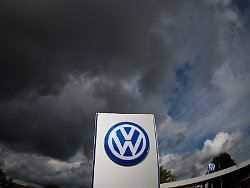Tuesday, November 9th, 2021
Lawsuit against internal combustion engines
Greenpeace is suing VW for CO2 emissions
An activist, an organic farmer and the two managing directors of Greenpeace want to force Volkswagen to exit the business with internal combustion engines. For this they go to court. A comparable case shows that they have a chance of success.
The two managing directors of Greenpeace Germany, together with a climate activist, have filed a lawsuit against Volkswagen AG for lack of climate protection at the Braunschweig Regional Court. In addition, Greenpeace supported the identical lawsuit filed by an organic farmer before another German regional court, according to a statement from the environmental organization. The plaintiffs argue that the gigantic CO2 emissions of the Wolfsburg-based car company are making a significant contribution to the climate crisis and its consequences. VW’s business model is not compatible with the goal of limiting the global temperature increase to 1.5 degrees.
To protect their freedom and property rights, the plaintiffs are calling on VW, among other things, to end the global sale of climate-damaging combustion engines by 2030 at the latest. If the lawsuit were successful, a good two gigatons less CO2 would be emitted by 2040, it said. In their argumentation, Greenpeace directors Martin Kaiser and Roland Hipp, Fridays for Future activist Clara Mayer and the farmer also rely on the Federal Constitutional Court’s climate share and a Dutch judgment against the Shell oil company.
VW declined the request
At the beginning of September, Deutsche Umwelthilfe (DUH) and Greenpeace took legal action against four German corporations to oblige them to do more climate protection. BMW, Mercedes-Benz and VW as well as the oil and gas company Wintershall Dea were sent cease and desist letters.
At the end of October, VW rejected the legal request to reduce its CO2 emissions more quickly. From VW’s point of view, disputes in civil courts through lawsuits against individual companies are not the right way to do justice to this task. The company has clearly committed itself to the Paris Climate Agreement and wants to be CO2-neutral on the balance sheet by 2050 at the latest. It was also the responsibility of the legislature to shape climate protection, it said last.
“A huge CO2 emitter like Volkswagen has to bow to international climate targets and the ruling from Karlsruhe,” Kaiser said on the sidelines of the climate conference in Glasgow. “Only with a quick goodbye to the combustion engine can VW make its contribution to limiting the global temperature increase to 1.5 degrees.”
Shell case gives plaintiffs hope
A similar lawsuit has already been successful: In May, a Dutch court found that not only states but also corporations had to reduce their greenhouse gas emissions and condemned the Shell group with all its subsidiaries to do more climate protection.
VW, as the world’s second largest car manufacturer, refuses to present a strategy that is based on a residual CO2 budget that is compatible with the 1.5 degree target, according to the Greenpeace announcement. In order to meet the budget, the group must reduce its CO2 footprint by at least 65 percent by 2030 compared to 2018, combustion engines are likely to make up only a quarter of all VW cars sold by then and will no longer be put on the market from 2030.
